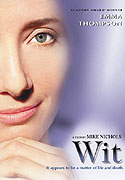Réalisation:
Mike NicholsPhotographie:
Seamus McGarveyActeurs·trices:
Emma Thompson, Christopher Lloyd, Eileen Atkins, Audra McDonald, Harold Pinter, Raffaello Degruttola, Benedict Wong, David Zayas, Lachele Carl (plus)Résumés(1)
English literary scholar Vivian Bearing is a disciplined academian, an expert in the intricate metaphysical poetry of John Donne. She is prickly, precise and intensenly rational in her teaching and her life. Her academic cocoon protects her, cushions her, makes it possible to exist without the need of anyone. When she is suddenly faced with the most daunting of personal crises, a diagnosis of ovarian cancer, her 17th-century poetic world collides with the 21st-century experimental medicine, and a personal awakening is the in motion. (Cinemax)
(plus)Critiques (2)
At a deeper level, almost all films touch on the fear of death. Melodramas about dying people are used on a mass scale to thematicise it. This adaptation of Margaret Edson’s stage play resists being pigeonholed as a melodrama, just as Vivian refuses to accept the role of a passive victim of ovarian cancer. Concealed behind the guise of a touching and chillingly humorous story of one woman’s struggle, there is a film essay, an inventive polemic on how death is depicted in art. For Vivian, the starting point for reflecting on the depiction of that which cannot be depicted and naming of that which cannot be named is a poem by John Donne, to which she has devoted most of her scientific career, thus elegantly blending the personal and professional areas of the protagonist’s life. However, reading an apposite poem about death is not the same as dying. As a film about death, Wit is well aware of this contradiction and continuously draws our attention to it by violating melodramatic conventions and through Vivian’s commentary delivered to the camera. Unlike a classic melodrama, there is no survivor with whom we could sympathise and cry after the main protagonist dies. Two likable supporting characters, a nurse and Vivian’s former professor, serve primarily to convey certain theses related to death and dying (regression to childhood while licking ice cream or reading a children’s book). Despite its self-ironic breaching of the fourth wall, Wit is not coldly intellectual. With the substantial contribution of the excellent Emma Thompson, it rather illustrates the fact that a poignant film can be made without emotionally manipulating the viewer. Instead, Nichols and Thompson see us as equal partners in discussing a topic that concerns each of us. 85%
()
this one is hard to review. On one hand, Wit has two huge strengths, namely the subject matter and above all Emma Thompson in the lead role, who acts flawlessly. On the other hand, the film is so oppressive that it is indigestible, and there can be no talk of any charm and positive impressions. This is compact concentrated depression that should not be watched by anyone seriously ill or in a bad mental state. Dying in real time. It is really difficult to rate it with stars and percentages...
()

